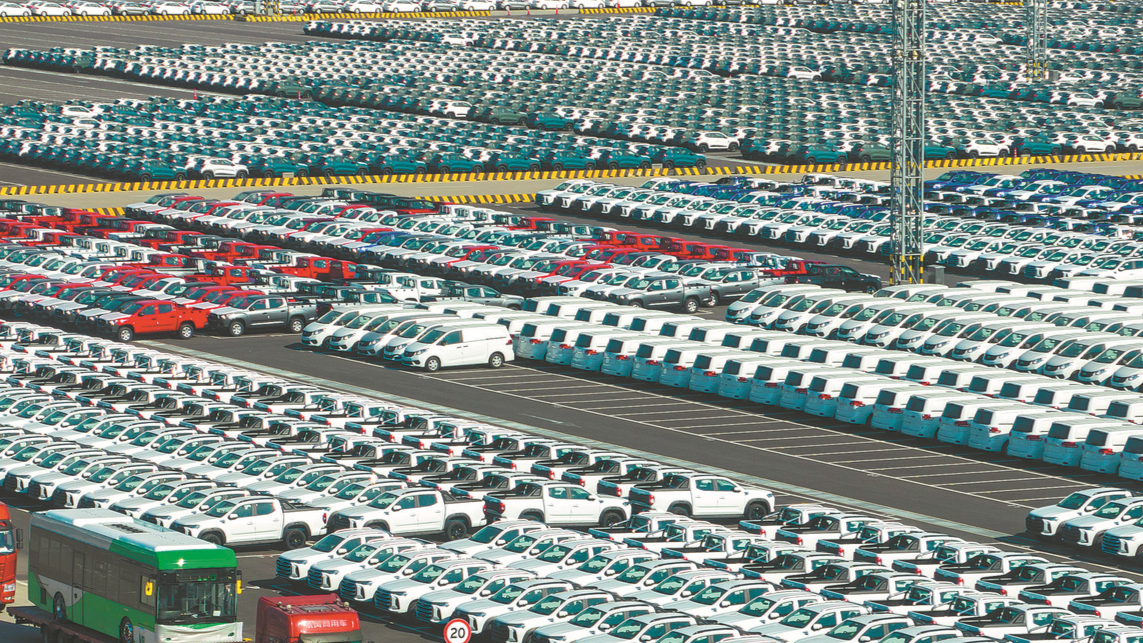
BEIJING - The United States should earnestly abide by World Trade Organization (WTO) rules and immediately stop further increasing additional tariffs on some Chinese goods, a spokesperson with the China Council for the Promotion of International Trade (CCPIT) has said.
On top of existing tariffs under Section 301, the United States on Tuesday decided to raise additional tariffs on its imports of some Chinese products including electric vehicles (EVs), lithium-ion batteries, solar cells, critical minerals, semiconductors, steel, aluminum, and cranes.
China's EV, lithium-ion battery, and solar cell industries, among others, have injected strong impetus into the global energy conservation drive, boosted emission reduction efforts, as well as promoted green innovation and development via continuous technological innovation, active participation in market competition, and deep integration into the global supply chain, the spokesperson said
"China's industry and commerce community firmly opposes this US act," said the spokesperson.
On behalf of China's industry and commerce community, the CCPIT and China Chamber of International Commerce have called on the United States to earnestly abide by WTO rules and immediately revoke these tariff increases.
They encouraged the industry and commerce communities of both sides to enhance mutual trust and cooperation, jointly maintain the stability and smooth operation of industrial and supply chains, and work for the accelerated recovery of the world economy.
ALSO READ: Biden unwisely dons the mantle of 'tariff man'
China's EV, lithium-ion battery, and solar cell industries, among others, have injected strong impetus into the global energy conservation drive, boosted emission reduction efforts, as well as promoted green innovation and development via continuous technological innovation, active participation in market competition, and deep integration into the global supply chain, the spokesperson said.
The Office of the US Trade Representative has ignored WTO rules and continued to abuse the Section 301 tariff review procedure to substantially increase tariffs on some products imported from China, said the spokesperson, calling it a typical form of unilateralism and trade protectionism practice.
At the same time, the United States provides a large amount of subsidies for its own electric vehicle, semiconductor and other industries, which obviously violates the principle of market economy and international economic and trade rules, and seriously undermines the stability and security of global industrial and supply chains, said the spokesperson.
The additional levy will cause tariffs on Chinese EV imports to rise to 100 percent this year, while the tariff rate will increase to 50 percent on solar cell imports this year. In addition, tariffs on certain Chinese steel and aluminum products will climb to 25 percent this year, and semiconductor tariffs will soar to 50 percent by 2025.
ALSO READ: Spokesperson: Popularity of China's new energy products not due to subsidies
US media CNN has criticized the Biden administration's latest tariff hikes on an array of Chinese products as "a bad idea."
In a Tuesday article titled "What Biden's tariffs on Chinese imports may mean for American jobs, the economy and inflation," CNN said history and research have shown that the economic effects of tariffs often fail to "live up to the hype."
"Economists expect that the newly announced $18 billion in tariffs likely will have a minimal near-term impact on GDP, inflation and monetary policy ... However, on a broader level, the picture could be more complex," it said.
It listed similar actions of former US presidents George W. Bush, Barack Obama and Donald Trump as examples. In 2002, when then President Bush placed tariffs on imported steel and aluminum products from China, it resulted in higher prices for American steel-consuming industries and led to a steep loss of jobs throughout the steel industry.
ALSO READ: China firmly opposes US tariff hike on Chinese goods
Seven years later, when then President Obama increased tariffs on tires imported from China, the initiative came at a cost of $1.1 billion to Americans in the form of higher prices, the Peterson Institute for International Economics found.
The US International Trade Commission said in a 2023 study that US importers "bore nearly the full cost" of the Trump tariffs
"The 2018 tariffs imposed by Trump did not result in an immediate boost to manufacturing employment but instead led to a net loss of jobs and rising prices for consumers due to higher input costs and retaliatory tariffs," the article quoted US Federal Reserve economists as saying.
"Tariffs typically make more political sense than economic sense," Ryan Sweet, chief US economist at Oxford Economics, noted.
"Most economists view tariffs as a bad idea because they prevent a country from reaping the benefits of specialization, disrupt the movement of goods and services, and lead to a misallocation of resources," Sweet wrote.
"Consumers and producers often pay higher prices when tariffs are implemented," he said.
ALSO READ: Experts: US tariffs won't hurt too much
That's because tariffs tax imports when they come ashore, adding costs for US distributors, retailers and, ultimately, consumers.
The US International Trade Commission said in a 2023 study that US importers "bore nearly the full cost" of the Trump tariffs.
Worse, some businesses appeared to take advantage of the trade war by bumping up prices even higher, according to the article.
"The New York Fed found that the 2018 tariffs cost US households $419 per year because of higher tax burdens and market efficiency losses."
The net economic effect of the import tariffs, retaliatory tariffs and agricultural subsidies "was at best a wash, and it may have been mildly negative" to US jobs and businesses, the article said, quoting a US National Bureau of Economic Research working paper published in January 2024.


